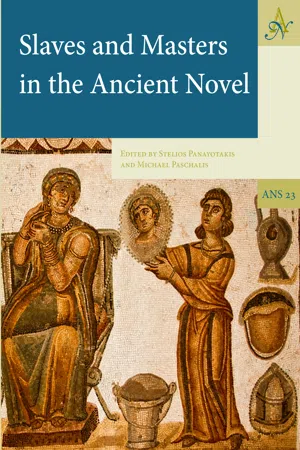
Slaves and Masters in the Ancient Novel
- 411 pages
- English
- PDF
- Available on iOS & Android
Slaves and Masters in the Ancient Novel
About this book
The present volume contains revised versions of most of the papers that were delivered at RICAN 7, which was held in Rethymnon, Crete, on 27-28 May 2013. The focus of the conference was on the portrayal and function of male and female slaves and their masters/mistresses in the ancient novel and related texts; the complex relationship between these social categories raises questions about slavery and freedom, gender and identity, stability of the self and social mobility, social control and social death. The papers offer a wide and rich range of perspectives: enslavement of elite women in Chariton's Callirhoe and Stoic ideas of moral slavery in Dio Chrysostom (Hilton); reversal of social status and techniques of (self-)characterization in Chariton (De Temmerman); the interaction between implicit and explicit narratives of slavery in Chariton and its effect on the readers of the novel (Owens); the narratological, structural and symbolic centrality of slavery in Xenophon's Ephesiaka (Trzaskoma); the socio-historical dimensions of slavery and the prominent discourse on despotism in Iamblichus' Babyloniaka (Dowden); the balance between historical accuracy and fiction in the representation of slavery in Achilles Tatius (Billault); animals, human slaves and elite masters, and the presence of Rome in Longus' Daphnis and Chloe (Bowie); the distribution of slaves on the geographical, cultural and moral maps drawn in Heliodorus' Aithiopika (Montiglio); slave women and their relationships to their mistresses as positive and negative paradigms of love in Heliodorus' Aithiopika (Morgan and Repath); the freedman's world as a self-perpetuating and closed universe in Petronius' Satyrica (Bodel); beauty, slavery and the destabilization of societal norms and authority figures in Petronius' Satyrica (Panayotakis); the interaction between Roman comedy and elegy in the representation of the relationship of Lucius and Photis in Apuleius' Metamorphoses (May); a comparative analysis of the semantics and function of slavery-related terms in pseudo-Lucian's Onos and Apuleius' Metamorphoses (Paschalis); enslaved and free storytelling in the Life of Aesop and the history and evolution of the ancient fable tradition (Lefkowitz).
Frequently asked questions
- Essential is ideal for learners and professionals who enjoy exploring a wide range of subjects. Access the Essential Library with 800,000+ trusted titles and best-sellers across business, personal growth, and the humanities. Includes unlimited reading time and Standard Read Aloud voice.
- Complete: Perfect for advanced learners and researchers needing full, unrestricted access. Unlock 1.4M+ books across hundreds of subjects, including academic and specialized titles. The Complete Plan also includes advanced features like Premium Read Aloud and Research Assistant.
Please note we cannot support devices running on iOS 13 and Android 7 or earlier. Learn more about using the app.
Information
Table of contents
- Contents
- Acknowledgements
- Introduction
- The Role of Gender and Sexuality in the Enslavement and Liberation of Female Slaves in the Ancient Greek Romances
- Noble Slaves: The Rhetoric of Social Status Reversal in the Ancient Greek Novel
- Callirhoe: A Therapeutic Slave Narrative
- Slavery and Structure in Xenophon of Ephesus
- Slavery and Despotism in Iamblichos’ Babyloniaka
- Achilles Tatius, Slaves, and Masters
- Animals, Slaves and Masters in Longus’ Daphnis and Chloe
- They Get By Without a Little Help From Their Slaves: The Exceptional Destiny of Chariclea and Theagenes
- Mistresses and Servant-women, and the Slavery and Mastery of Love in Heliodoros
- Liber esto: Free Speech at the Banquet of Trimalchio
- Slavery and Beauty in Petronius
- Apuleius’ Photis: Comic Slave or Elegiac Mistress?
- Masters and Slaves in pseudo-Lucian’s Onos and Apuleius’ Metamorphoses
- Reading the Aesopic Corpus: Slavery, Freedom, and Storytelling in the Life of Aesop
- Contributors
- Abstracts
- Indices